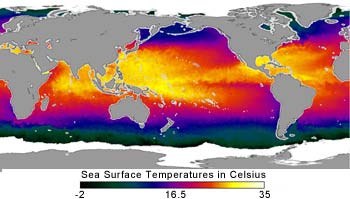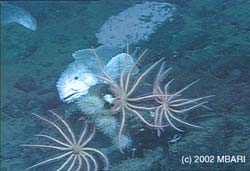The Atlantic Ocean becomes a meteorological mixing bowl from June 1 to November 30, replete with all needed ingredients for a hurricane recipe. NASA turns to its cadre of satellites to serve up a feast of information to the forecasters who seek to monitor and understand these awesome storms.
Typically, during the peak of hurricane season, from late August to mid-September, tropical cyclones of interest to U.S. coastal regions form around the Cape Verde Islands off Africa. NASA satellites ar
New evidence supports volcanic eruption theory
The extinction of the dinosaurs – thought to be caused by an asteroid impact some 65 million years ago – was more likely to have been caused by a ’mantle plume’ – a huge volcanic eruption from deep within the earth’s mantle, the region between the crust and the core of the earth.
This theory, already supported by a significant body of geologists and palaeontologists, is strengthened by new evidence to be presented
Analysis of 11,000 mammal, amphibian and bird species shows major gaps in global coverage
At least 223 bird, 140 mammal and 346 amphibian species threatened with extinction currently have no protection whatsoever over any part of their ranges, according to the most comprehensive analysis of its kind of the world’s protected area system.
In addition, many existing protected areas are so small in size as to be virtually ineffective in conserving species, placing another 9
Tiny organisms living in the oceans could be playing a significant role in human health, an audience at this year’s BA Festival of Science will hear today (8 September).
Professor Peter Liss of the University of East Anglia (UEA) School of Environmental Sciences will talk about how microscopic marine organisms called plankton produces gases that can travel in the atmosphere until they ultimately get deposited on land. Here they can become important in supplying micronutrients to human diets,

NASA’s improved global climate computer model, which simulates and projects how the Earth’s climate may change, indicates that the oceans have been absorbing heat since 1951 and will continue to absorb more heat from the atmosphere over the next 50 years. This increasing ocean heat storage suggests that global surface temperatures may warm less than previous studies projected, while the ocean acts as a bigger heat sponge. Further, such additional ocean heating would likely change regional c

Exploring a deep-sea ridge off Northern California, scientists at the Monterey Bay Aquarium Research Institute (MBARI) have discovered a unique undersea nursery, where groups of fish and octopus brood their eggs, like chickens on their nests. This is the first time that marine biologists have directly observed any deep-sea fish brooding its eggs. It is also the first time that two different types of mobile deep-sea animals have been observed brooding together in the same area. Although the scientists